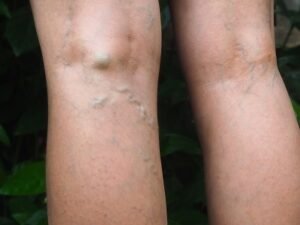Varicose veins are a common vascular condition that affects many individuals, causing discomfort and sometimes pain. If you’re suffering from varicose veins, you may wonder: what doctor treats varicose veins? Understanding the specialists who can help you manage and treat this condition is crucial for finding relief and improving your vascular health.
Understanding Varicose Veins
Varicose veins are enlarged, twisted veins that often appear blue or dark purple. They usually occur in the legs and feet due to damaged or weakened vein walls and valves. Common symptoms include:
- Swelling in the legs
- Aching or heaviness in the legs
- Throbbing or cramping in the legs
- Itching around the veins
- Skin discoloration around the affected area
Who Should You See for Varicose Veins?
When dealing with varicose veins, it’s essential to consult the right medical professionals who specialize in vascular health. Here are the types of doctors who treat varicose veins:
Vascular Surgeons
Vascular surgeons are specialists who focus on the diagnosis and management of conditions affecting the blood vessels, including varicose veins. They can perform both surgical and non-surgical treatments, depending on the severity of your condition.
Treatment Options: Vascular surgeons can offer treatments such as sclerotherapy, laser therapy, and minimally invasive procedures like endovenous ablation to treat varicose veins effectively.
Phlebologists
Phlebologists are medical professionals who specialize in vein care. They often have a background in vascular medicine and focus on diagnosing and treating vein-related conditions, including varicose veins.
Treatment Options: Phlebologists can provide treatments like ultrasound-guided sclerotherapy and ambulatory phlebectomy to relieve symptoms and improve the appearance of varicose veins.
Interventional Radiologists
Interventional radiologists are experts in using medical imaging to guide minimally invasive procedures. They can treat varicose veins using techniques such as endovenous laser therapy (EVLT) and radiofrequency ablation (RFA).
Treatment Options: Interventional radiologists can perform procedures that close off or remove varicose veins using heat generated by lasers or radiofrequency energy.
Dermatologists
Dermatologists specializing in vein disorders can diagnose and treat varicose veins, especially in cases where the veins are close to the skin’s surface and primarily for cosmetic reasons.
Treatment Options: Dermatologists may offer sclerotherapy and other cosmetic treatments to improve the appearance of varicose veins.
Vascular Medicine Specialists
Vascular medicine specialists are internists or cardiologists with specialized training in vascular diseases. They can diagnose and manage varicose veins as part of their broader practice in vascular health.
Treatment Options: Vascular medicine specialists may recommend lifestyle changes, compression stockings, and medical therapies to manage varicose veins.
Choosing the Right Doctor
When deciding which doctor to see for varicose veins, consider the severity of your condition, your medical history, and your treatment preferences. It’s essential to consult a healthcare professional who specializes in vascular health and has experience treating varicose veins.
Understanding Varicose Veins
Varicose veins are enlarged, swollen, and twisted veins that typically appear blue or dark purple. They often occur in the legs and can be caused by weak or damaged valves in the veins. This condition can lead to discomfort, pain, and sometimes more serious complications if left untreated.
The Role of a Phlebologist
A phlebologist is a doctor who specializes in the diagnosis and treatment of vein disorders, including varicose veins. They are trained to use various methods to manage and eliminate varicose veins, helping patients achieve healthier and more comfortable legs.
Interventional Radiologists
Interventional radiologists are medical doctors who specialize in minimally invasive procedures to diagnose and treat diseases throughout the body, including varicose veins. They use imaging techniques such as ultrasound to guide treatments like sclerotherapy and endovenous laser treatment (EVLT).
Vascular Surgeons
Vascular surgeons are experts in the surgical and non-surgical treatment of diseases of the vascular system, which includes veins and arteries. They can perform procedures like vein stripping, ambulatory phlebectomy, and endovenous thermal ablation (EVTA) to treat varicose veins effectively.
Dermatologists
Dermatologists are doctors who specialize in treating conditions related to the skin, hair, and nails. Some dermatologists have training in cosmetic dermatology and may offer treatments like sclerotherapy for varicose veins.
Primary Care Physicians (PCPs)
Your primary care physician is often the first healthcare professional you consult about your health concerns. They can provide initial evaluation and may refer you to a specialist such as a phlebologist or vascular surgeon for further evaluation and treatment.
Advantages of Seeking Treatment
- Pain Relief: Treatment for varicose veins can alleviate pain and discomfort associated with this condition, improving your quality of life.
- Improved Appearance: Treating varicose veins can improve the appearance of your legs, boosting self-confidence and allowing you to wear clothes you might have avoided before.
- Prevention of Complications: Treating varicose veins can prevent complications such as ulcers and blood clots, which can be serious if left untreated.
- Minimally Invasive Procedures: Many treatments for varicose veins are minimally invasive, meaning less pain and faster recovery compared to traditional surgery.
- Long-Term Results: With appropriate treatment, you can achieve long-term results and reduce the likelihood of varicose veins recurring.
Conclusion
If you’re experiencing symptoms of varicose veins, consulting with a qualified healthcare provider is crucial for proper diagnosis and treatment. Whether you choose to see a vascular surgeon, what to expect at a vein clinic, interventional radiologist, dermatologist, or vascular medicine specialist, they can help you find relief from discomfort, improve the appearance of your legs, and prevent complications associated with varicose veins.
Remember, early intervention and proper management can make a significant difference in your vascular health and overall well-being. Don’t hesitate to seek medical advice and explore treatment options that best suit your needs.
